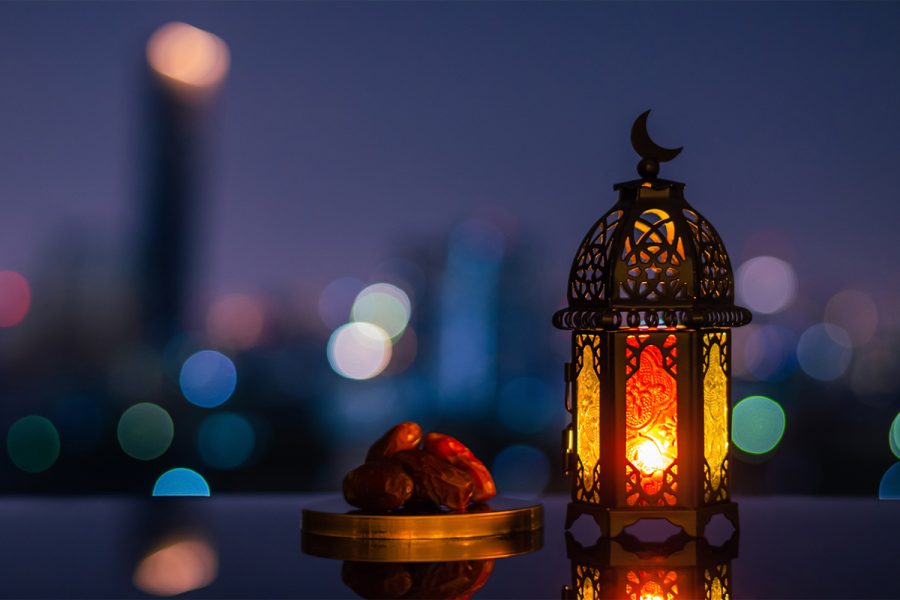The Long Awaited Month
April 25, 2022
It is believed by Muslims that the Month of Ramadan is when the Verses of the Holy Quran were being revealed to Prophet Muhammad (pbuh). Therefore, this month is also referred to as the Month of the Quran and one of the reasons why this month is considered Holy.
There are a few things that are very big in this month; fasting being one of them. Muslims fast from sunrise to sunset, excusing themselves of food, water and sinning. This Holy month is extremely rewarding for Muslims, full of huge opportunities for them to get closer to their Creator. They are encouraged to help people around them and to stay away from sinning. This month is an outlet for Muslims to physically, mentally, and spiritually cleanse themselves of bad habits. “So why do Muslims fast? If they can give up something Allah made to benefit them, they can surely give up habits that are harmful to their souls.”
Ramadan isn’t only about fasting; Muslims aim to strengthen their connection with Allah. They read the Holy Quran, recite Duas (invocation/supplication) and complete extra prayers. Another way Muslims connect with Allah is obtaining themselves from sinning and committing immoral acts throughout this month especially.
A simple tradition and fun fact: when it is time, many Muslims prefer to break their fast, or Iftar with a date. The fruit is very popular during this month because of this. If visited during the month of Ramadan, almost every Muslim household will have a pack of dates.
After Ramadan is over, there is a 3-day Iftar for them called Eid-al-fitr (Iftar is when the Muslims break their fast – kind of like dinner). Eid is a holiday of joy and thankfulness for all Muslims around the globe. This holiday lasts for 3 days and during these days Muslims come together in celebrating the end of a rewarding month with a final Iftar. Some common traditions during these days include giving gifts, visiting friends and relatives’, and being charitable.
Iliana Vega, Annabelle Thao, Julia DeBoard, Vien Santiago and Jhea Gonazles, all freshman in Pitman High School, were asked about their knowledge when it comes to Ramadan.
Vega responded with, “I don’t actually know about it that much. Most of what I know comes from my friends who participate in Ramadan.” Thao said, “Fasting from sunrise till sunset and it starts on the new moon. And I know Muslims also have daily prayers. I don’t really know too much about it though.” While DeBoard replied with, “I don’t know a whole lot. The only thing I know is that Muslims can’t eat or drink from sunrise till sunset. But I don’t really know when that starts.” Santiago shared that, “All I know is that people fast for a month and that it’s mostly only practiced by people who practice Islam. I know that Muslims fast from sunrise till sunset. That’s all.” Lastly, Gonzales led with, “My knowledge of Ramadan is like a 2/5. We don’t really have anything in school that teaches us about it. All our knowledge comes from our social connections.”
The interviewees were also asked whether they think PHS is doing something to educate kids about Ramadan, if not, should they do something when the month of Ramadan begins. If yes, what?
Vega thinks that, “I don’t think Pitman is doing anything to educate students about Ramadan, but I think they should. I knew almost nothing before my relationship with a new friend. It’s disappointing that we’re not properly educated about it.” Thao said, “I don’t think Pitman does anything but I do think that they should. To be inclusive to people with different cultures and religions.” While DeBoard replied with, “I don’t think they are doing anything to educate people about what Ramadan is. I think they should be. I feel like dedicating even one day, which is the bare minimum, is better than nothing. Like, maybe a speaker or something could be invited to talk to students.”
Santiago started with, “Well, at least not in the freshman level, though there may be mentions of it in social studies classes.” He continued with, “Given how unfortunately unfamiliar a lot of our freshmen are to the world, I feel like Ramadan, just like Christmas or Easter, should be taught about or least mentioned in our classes.” Lastly, Gonzales responded with, “In all honesty, no, I do not believe that Pitman is doing something to educate its students about Ramadan. If so, I have never heard of it. Small announcements or discussions within classes should be enough to keep students well informed and understanding of those practicing Ramadan or any religious traditions for that matter.”
At the end of the day, Ramadan is very important to Muslims and Islam being the 2nd most practiced religion in the world, one would think that more students would have a knowledge of what Ramadan is. Things like Eid, maybe not since it lasts for a very short period of time. But Ramadan is a huge part of Islam; and students not knowing much about it is a problem. And schools not doing anything about said problem in a diverse country such as the U.S says more than this article.
